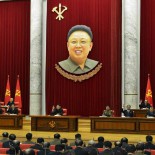DPRK Ambassador to China to be Replaced
 Choe Pyong Gwan, the DPRK Ambassador to China, will vacate his position later this month. He attended a ceremony in Beijing on Saturday and returned to Pyongyang. Choe Pyong Gwan arrived in Beijing on 20 April and has served in the position for about six months. He replaced Choe Jin Su, who had served in the position for ten (10) years and returned to Pyongyang to become a deputy vice minister of Foreign Affairs.
Choe Pyong Gwan, the DPRK Ambassador to China, will vacate his position later this month. He attended a ceremony in Beijing on Saturday and returned to Pyongyang. Choe Pyong Gwan arrived in Beijing on 20 April and has served in the position for about six months. He replaced Choe Jin Su, who had served in the position for ten (10) years and returned to Pyongyang to become a deputy vice minister of Foreign Affairs.
Kyodo reported the possibility of the DPRK replacing its ambassador to China late last week. Choe Pyong Gwan’s replacement is Ji Jae Ryong. Ji has been tied to Jang Song Taek and Kim Kyong Hui for three decades.
Hankyoreh reports:
Foreign affairs sources in Beijing report that Choi returned to Pyongyang on Saturday, and that his replacement Ji Jae-ryong, the 68-year-old vice director of the Workers’ Party of Korea International Department, is to formally take over the position in Beijing shortly after attending an event Monday in Pyongyang to commemorate the 60th anniversary of the Chinese army’s participation in the Korean War. Ji, who is also a known close associate of WPK Ministry of Administration Council Director Jang Sung-taek, North Korean leader Kim Jong-il’s brother-in-law, appears likely to receive the approval of the Chinese Foreign Ministry, the sources said.
Observers say Choi’s sudden replacement after six months in his position is exceptional, given the precedent of long terms served by previous ambassadors Ju Chang-jun and Choi Jin-su. Ju served for approximately 12 years beginning in 1988 and was succeeded by Choi Jin-su, who was in Beijing for close to ten years beginning in 2000.
In light of the relatively small amount of diplomatic activity by Choi Byong-kwan in Beijing, observers in Beijing diplomatic circles have speculated about possible health problems or a reprimand for performance of his duties.
Other analysts have suggested that the replacement represents an attempt to step up diplomatic relations with China by bringing in a figure with more weight as ambassador to the country at a time when North Korea-China relations are enjoying unprecedented closeness, with two China visits by Kim Jong-il within 2010. Whereas Choi, a traditional administrative affairs veteran who served two terms as consular bureau director in the North Korean foreign ministry, was a lower-level figure in comparison with previous ambassadors to China, Ji is known to have some weight within the WPK with his background as a International Department vice director. In other words, analysts are saying, Ji was brought in as ambassador to China with the goal of increasing WPK and Chinese Communist Party interchange following North Korea’s recently strengthening of its party organization through a WPK meeting of party representatives.
Daily NK offers some background on Choe’s replacement:
He grew close to National Defense Commission Vice Chairman Jang Sung Taek in the 1970s while acting as Chairman of the Central Committee of the Socialist Working Youth League. When Jang Sung Taek was pushed out in 2004, Ji was also demoted and sent to a provincial level position, but reappeared when Jang made his comeback in 2007.
Another possible reason for Choe Pyong Gwan’s anonomalously short tenure in Beijing is that his appointment was always intended to be temporary.
